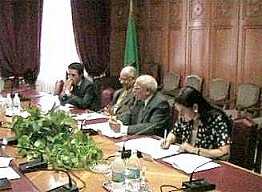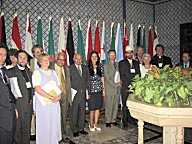League of Arab States,
Inter-Civilizations Dialogue Group
24-sep-03, 11:15 am
 We meet Samia Bibars, Second Secretary of the Inter-Civilizations Dialogue
Department of the League of Arab States. We already met her last night;
She is very well-educated, personable, and Western in
appearance and dress. She will be very helpful to us throughout
the trip, and we take a great liking to her.
We meet Samia Bibars, Second Secretary of the Inter-Civilizations Dialogue
Department of the League of Arab States. We already met her last night;
She is very well-educated, personable, and Western in
appearance and dress. She will be very helpful to us throughout
the trip, and we take a great liking to her.
At 11:15 we arrive at the General Secretariat of the League of Arab
States, a lovely building near the National Museum.
We meet Dr. Ahmad Kamel Magd,
who has a PhD on the topic of "American Judicial Review".
He lived for 7 years in the U.S.A, and has done much work
with interfaith communication.
He is the Arab League Commissioner for Inter-Civilizations Dialogue.
Also with us are several other members of his group, and Ms. Bibars.
Dr. Magd says that he'll start with 7 minutes of remarks and then we'll
open up the discussion. This sounds great; by now we're accustomed to
long speeches instead of dialogue.
However, he instead spends 35 minutes talking, then his second-in-command,
Mr. Yassin, talks awhile, and then the meeting ends.
He says some interesting things, but also rambles.
From my notes:
Inter-civilizations dialogue is now in the context of rapidly
hastening communication and travel.
The issue of dialogue becomes ever more relevant and imperative in
this context.
There is a danger for America in being the sole superpower; this is a role
that requires great humility.
With modern communications and media, brainwashing becomes much easier.
A small group can get anyone elected.
(While he doesn't say it, the implication is that the last U.S. election
was, essentially, bought.)
The prerequisites for dialogue are:
1) There are other people and other opinions; diversity is good
2) Don't try to convert the other; accept disagreement.
A current danger is the collapse of "preservative institutions"
like family and neighborhoods, the growth of violence, and
the growing scarcity of resources.
Water, he says, will be a dominant issue in the 21st century.
He is careful to talk about the U.S. rather than "the West".
The U.S. is different; for one thing, America never colonized the
Arab world. Also, the Arab nations joined the U.S. in opposing the U.S.S.R.
Arabs feel marginalized and ill-treated.
Dr. Magd recounted a conversation with a Very High-ranking American
official (that he wouldn't name),
who bluntly accused him: "you guys are killing our friends
in Israel".
This deeply offended him, given that Egypt has been at peace with
Israel for decades and has given much support to the U.S.
When asked about a fair resolution of the Palestinian crisis, he
cited an article by Abraham Borg, President of the Knesset, in which
he argued that for peace, everyone must sacrifice an aspiration.
When pressed for details on viable endpoints, Dr. Magd refused to
discuss them, saying that we need to focus instead on the process.
[A mistake, in my opinion.]
Clinton's efforts at arbitration were seen as sincere and fair.
The arrivals
of Sharon and Bush have caused great damage.
The future of Jews in the new century, he says, depends on Jews
in Israel and the U.S.
He further emphasizes the need for the U.S. to be a fair mediator.
Dr. Magd tells many rambling anecdotes, waxing nostalgic
about the time when Muslims, Christians, and Jews lived together amicably.
[The last Jews fled Cairo in the late '60s, when Nasser aroused anti-Jewish
sentiment as a way of deflecting attention from his own failed
policies. There is now only one Synagogue in Cairo,
with an elderly caretaker and no regular services.]
Dr. Magd agrees that the Arab world has communicated poorly, giving too
much voice to extremists.
He does say that "Americans are the best listeners in the world"
and that the Arabs have failed to speak up.

|
Mr. Yassin talks about how Arabs could portray themselves.
Arabs need to learn self-criticism and objectivity. He also says
that America has a very positive image in the Arab world.
He decries the current American bias towards Israel, in particular that
the U.S. is often the only country to veto U.N. resolutions condemning
Israel's stated intention to exile or kill Arafat.
He says that International Law explicitly allows citizens of an occupied
country (ie: Palestine) to resist the occupation.
He particularly cites the demolishing of houses.
(The extrajudicial demolition seems to particularly outrage the Arabs that
we have met.)
[Mr. Yassin is lecturing us, though, rather than engaging in dialogue.]
In closing, Dr. Magd gives some advice to Bashar: be American,
be a witness for moderate Islam,
and don't ask for advice from the Arab world.
|